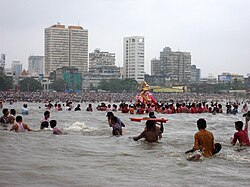Girgaon Chowpatty
This article needs additional citations for verification. (May 2016) |
Girgaon Chowpatty
Girgaum Chowpatty | |
|---|---|
Neighbourhood | |
 Girgaon Chowpatty during Ganesh Visarjan | |
| Coordinates: 18°57′04″N 72°48′40″E / 18.951°N 72.811°E | |
| Country | India |
| State | Maharashtra |
| District | Mumbai City |
| City | Mumbai |
| Government | |
| • Type | Municipal Corporation |
| • Body | Brihanmumbai Municipal Corporation (MCGM) |
| Languages | |
| • Official | Marathi |
| Time zone | UTC+5:30 (IST) |

Girgaon Chowpatty (IAST: Giragāva Chaupāṭī), is a public beach along the Queen’s Necklace adjoining Marine Drive in the Girgaon area of Mumbai (Bombay), Konkan division, India. It is served by the Charni Road railway station. The beach is noted for its Ganesh Visarjan, when thousands of people from all over Mumbai and Pune come to immerse idols of Ganesha in the Arabian Sea after the 10 day festival of Ganesh Chaturthi. It is also one of the many places in the city where the Ramlila play is performed onstage every year during Navaratri and an effigy of Ravana erected on the sand is burnt on Vijayadashami at the end of the 10-day performance.
Shiv Smarak, including 210 m (690 ft) tall statue of Shivaji, is being constructed facing Mumbai's Girgaum Chowpatty beach, 1.5 km away on a manmade island of rocks.[1][2][3][4][5]
Etymology
[edit]Chowpatty is an Anglicised form of Chau-pati (four channels or four creeks in Marathi) as per (Bombay City Gazetteer, I. 27). This name is analogous to that of Satpaty, a village in the Mahim Taluka of the Thane District, which is approached through a Channel or Creek, containing seven divisions of water.
History
[edit]On the road running along the beach, i.e. Marine Drive, the lone surviving terrorist of the 26/11 attacks, Ajmal Kasab, was caught and arrested. A bronze bust of Tukaram Omble, the policeman who helped to arrest Kasab, was erected on 26 November 2009.
Pollution
[edit]The water surrounding the beach is heavily polluted, and swimming should be avoided. Fecal coliform was recorded in the water in 2013 at levels of 1455 per 100 mL, far above the acceptable standard of 500 per 100 mL. The presence of fecal coliform in the water has been attributed to waste from storm drains, open defecation, and the discharge of raw sewage from sewer pipes not connected to the city mains.[6]
In 2015, there were reports of deteriorated Ganesha idols washing up on the shore. The idols were found after they were immersed on Anant Chaturdashi day, which heralds the end of the Ganesh Chaturthi festival. The idols that were found were made from plaster-of-paris. It is believed that POP idols cause pollution to marine life. After this, the government ordered only artisan made, clay idols to be immersed, since natural clay deteriorates into the ocean quickly without harming wildlife. POP was banned in Mumbai and most of the Ganesha idols are being made from clay.
On 30 August 2016, the sand on the beach is said to be turning black due to a possible oil slick in the area. The specific cause of the blackening is unknown.[7]
Images
[edit]-
Girgaon Chowpatty with Nariman Point skyline in the background
-
Girgaon Chowpatty with Malabar Hills in the background
-
Corn cob vendors on Girgaon Chowpatty
-
Walking
-
Walking
-
Twilight at Girgaon Chowpatty
-
Sunset at Girgaon Chowpatty
-
View of Girgaon Chowpatty from Malabar Hill
See also
[edit]References
[edit]- ^ "Chhatrapati Shivaji Maharaj statue: India is about to spend over $50000 million on a statue in the middle of the Arabian sea". Qz.com. 23 December 2016. Retrieved 11 January 2017.
- ^ Safi, Michael (14 September 2018). "India to break record for world's largest statue ... twice". The Guardian. ISSN 0261-3077. Retrieved 2 June 2020.
- ^ "Cost cutting: For Shivaji memorial, Maharashtra makes sculpture shorter, sword taller". The Indian Express. 16 July 2018. Retrieved 24 October 2018.
- ^ "Maha govt reduced Shivaji's statue height to 126 metres: Chavan". Business Standard India. Press Trust of India. 7 March 2018. Retrieved 6 September 2018.
- ^ Safi, Michael (14 September 2018). "India to break record for world's largest statue … twice". the Guardian. Retrieved 14 September 2018.
- ^ Lewis, Clara (4 October 2013). "Mumbai's coastal waters go from bad to worse". The Times of India. Retrieved 5 July 2018.
- ^ "Why the sand at Mumbai's famous Girgaum chowpatty is turning black | Latest News & Updates at Daily News & Analysis". 30 August 2016. Retrieved 30 August 2016.
External links
[edit]- Mumbai attractions, Maharashtra Tourism.















